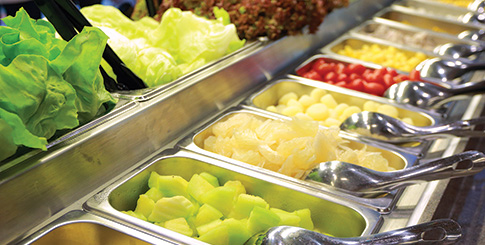The rise of ‘superfoods’ is also indicative of the trend. Deeply colored fruits and vegetables high in vitamins and antioxidants are gaining space on menus across foodservice channels. Ramsey points out that new products infused with superfoods are driving a good portion of Mann’s business. Blends of broccoli, carrots, beets, Brussels sprouts, and kale “offer convenience for operators who would otherwise need to purchase large quantities of several raw products and apply significant labor hours to clean, prep, and process. Our goal is to make these great sources of vitamins and other nutrients easy to use.”
Even schools and convenience stores, which in the past only minimally showcased produce, are making fresh produce central to their offerings. Not long ago, it was unimaginable to see a salad bar in a convenience store, but now these healthy options are alongside hot dogs, chips, and novelty beverages.
Clyde Jenkins, director of produce for Labatt Food Service in San Antonio, TX, services hundreds of convenience stores.
“A number of Stripes stores added fruit and salad bars; now they’re testing precut vegetables. As far as schools, we sold kale to districts before it was big in retail. Five years ago, schools wanted something besides salad mix, so we came up with a spinach and romaine mix they now purchase at a rate of 400 cases per week.” Labatt also provides fruit and vegetable cups with zucchini or kiwi slices, jicama sticks, or chunks of watermelon, papaya, and mango.
Trimming Waste
Waste, of course, is not a new topic in the industry. The sheer amount of perishables thrown out each day is staggering—whether unharvested by growers, uneaten by consumers, or unmarketable by retail outlets—especially when much of it is still edible. For this reason and more, reducing waste has become a front and center issue.
Michael Muzyk, president of Baldor, a receiver and distributor in New York City, is passionate about sustainability within foodservice. “If local is the most current trend, sustainability is the next. I challenged my team to figure out what to do with all our trimmings.” The result was a program called “SparCs” (‘scraps’ spelled backwards), which makes use of leftover peels and skins.
“To demonstrate the viability of the program,” Muzyk continues, “we teamed up with Dan Barbar of Blue Hill Farm who created an entire SparsCs-based menu. We also dry and mill SparCs and turn them into a nutritious powder that can be added to soups and smoothies, as well as items like gluten-free croutons.”
Do Organics Matter?
While organic produce has a place in the hearts and minds of many consumers, it is not a headliner in foodservice.



